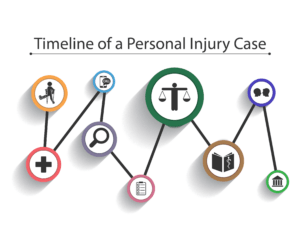
The process of filing a personal injury lawsuit is often specific to the kind of claim you have and where you happen to reside.
Here are some of the more frequently seen types of personal injury lawsuits you should know:
- Motor vehicle accidents
- Medical malpractice
- Workplace accidents
- Slip and fall
- Pet bite
- Wrongful death
- Product liability
Every personal injury lawsuit is unique, and each state has its own set of laws that govern how your case will be handled. That’s why you should have a legal team guiding your efforts.
Hire an Attorney
Most personal injury attorneys will review your case without charge to determine the strength of your complaint. Make sure to document your situation as thoroughly as possible from the start.
Once an attorney agrees to take your case, a few essential steps will follow.
Summons/Complaint
The summons is a filing that launches a lawsuit. States often require a filing fee, which will likely vary from state to state. The complaints will likely include some of the following details:
- Plaintiff and defendant
- The legal claims
- The facts that form the foundation of your case.
It’s during this process that the defendant will be notified of your complaint. Your attorney should make sure to follow all the proper procedures to ensure the defendant is legally served to avoid problems later.
Defendant’s Response
The legal process gives the defendant a certain amount of time to respond to a complaint. The court determines that length of time. Usually, the length of time varies but tends to take up to 21 days.
Their response will be the foundation of their defense, citing why they’re not at fault. You should be prepared for all possible answers.
Discovery
Once the summons and response have been issued, the legal teams work to build their case and defense. That entails a variety of steps.
- Interrogatories or questions submitted by each side.
- Requests for documents: Copies of critical documents in the case
- Requests for admission: This is when one side asks the other to admit to a particular fact.
- Depositions: This is when the parties ask each other questions orally and under oath. Depositions are often submitted as evidence.
- Physical Examination: A court may authorize a mental or physical examination.
Motions
Motions refer to when each legal team can request that the court issue a ruling or decision on a particular question.
Pre-Trial Negotiations
The majority of personal injury cases settle out of court. It’s during pre-trial negotiations that lawyers try to resolve a legal dispute.
Trial
When a personal injury case goes to trial, the elements of that stage of your lawsuit is much like what you’ve seen in movies.
- Selection of a jury
- Opening arguments
- Witness testimony
- Closing arguments
- Verdict
- Collecting on a Judgement
This is the part many clients hope will end lucratively. Getting paid is a critical element of a lawsuit and making sure the defendant can pay is essential. Many attorneys check to see if a defendant is financially viable at the start of legal action.
Appeal
While most personal injury cases end in a settlement, there is the chance that your case goes to trial and that either you or the defendant choose to appeal the outcome. In that event, your legal team of skilled Sunrise personal injury lawyers will go before an appellate court to prove their case using the same documents, testimony, and evidence used during your trial.
Are you considering a personal injury lawsuit? Contact Winston Law to review your case and your legal options. All consultations are free of charge.

